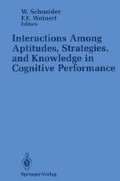Abstract
In the past 20 years, views of the interaction between knowledge and strategies have shifted radically. In the 1960s and early 1970s, the role of generally useful strategies such as rehearsal and organization were emphasized. Little if any attention was paid to knowledge of the content on which the strategies were performed, for example, the numbers or words that children were trying to remember. Individual differences were conceptualized at a quite general, traitlike level that did not often make contact with either strategies or content knowledge.
Access this chapter
Tax calculation will be finalised at checkout
Purchases are for personal use only
Preview
Unable to display preview. Download preview PDF.
References
Ashcraft, M. H. (1982). The development of mental arithmetic: A Chronometric approach. Developmental Review, 2, 213–236.
Ashcraft, M. H. (1987). Children’s knowledge of simple arithmetic: A developmental model and simulation. In J. Bisanz, C. J. Brainerd, & R. Kail (Eds.), Formal methods in developmental psychology (pp. 302–338). New York: Springer-Verlag.
Brown, A. L., Bransford, J. D., Ferrara, R.A., & Campione, J. C. (1983). Learning, remembering, and understanding. In P. H. Mussen (Ed.), Handbook of child psychology: Cognitive development (pp. 77–166). New York: Wiley.
Brown, A. L. & DeLoache, J. S. (1978). Skills, plans, and self-regulation. In R. S. Siegler (Eds.), Children’s thinking: What develops? (pp. 3–35). Hillsdale, NJ: Erlbaum.
Case, R. (1985). Intellectual development: Birth to adulthood. Orlando, FL: Academic Press.
Cavanaugh, J. C., & Perlmutter, M. (1982). Metamemory: A critical examination. Child Development, 53, 11–28.
Chi, M. T. H. (1978). Knowledge structures and memory development. In R. S. Siegler (Ed.), Children’s thinking: What develops? (pp. 73–96). Hillsdale, NJ: Erlbaum.
Flavell, J. H., Beach, D. H., & Chinsky, J. M. (1966). Spontaneous verbal rehearsal in a memory task as a function of age. Child Development, 37, 283–299.
Fuson, D. C., & Richards, J. (1982). The acquisition and elaboration of the number sequence. In C. J. Brainerd (Ed.), Progress in cognitive development, Vol. I. New York: Springer-Verlag.
Groen, G. J. & Parkman, J. M. (1972). A Chronometric analysis of simple addition. Psychological Review, 79, 329–343.
Groen, G. J., & Resnick, L. B. (1977). Can preschool children invent addition algorithms? Journal of Educational Psychology, 69, 645–652.
Ilg, F., & Ames, L. B. (1951). Developmental trends in arithmetic. Journal of Genetic Psychology, 79, 3–28.
Just, M. A., & Carpenter, P. A. (1985). Cognitive coordinate systems: Accounts of mental rotation and individual differences in spatial ability. Psychological Review, 92, 137–172.
Kail, R., & Bisanz, J. (1982). Information processing and cognitive development. In H. W. Reese (Ed.), Advances in child development and behavior, Vol. 17 (pp. 45–81). New York: Academic Press.
Kaye, D. B., Post, T. A., Hall, V. C., & Dineen, J. T. (1986). The emergence of information retrieval strategies in numerical cognition: A developmental study. Cognition and Instruction, 3, 137–166.
McGilly, K., & Siegler, R. S. (1989). How children choose among serial recall strategies. Child Development, 60, 172–182.
Miller, K., Perlmutter, M., & Keating, D. (1984). Cognitive arithmetic: Comparison of operations. Journal of Experimental Psychology: Learning, Memory, and Cognition, 10, 46–60.
Ornstein, P. A., Naus, M. J., & Liberty, C. (1975). Rehearsal and organizational processes in children’s memory. Child Development, 26, 818–830.
Payne, J. W., Bettman, J. R., & Johnson, E. J. (1988). Adaptive strategy selection in decision making. Journal of Experimental Psychology: Learning, Memory, and Cognition, 14, 534–552.
Piaget, J. (1952). The child’s concept of number. New York: W. W. Norton.
Schneider, W. (1985). Developmental trends in the metamemory-memory behavior relationship: An integrative review. In D. L. Forrest-Pressley, G. E. MacKinnon, & T. G. Waller (Eds.), Metacognition, cognition, and human performance, Vol. I (pp. 57–109). New York: Academic Press.
Siegler, R. S. (1986). Unities across domains in children’s strategy choices. In M. Perlmutter (Ed.), Minnesota symposium on child development, Vol. 20 (pp. 1–48). Hillsdale, NJ: Erlbaum.
Siegler, R. S. (1987a). The perils of averaging data over strategies: An example from children’s addition. Journal of Experimental Psychology: General, 116, 250–264.
Siegler, R. S. (1987b). Strategy choices in subtraction. In J. Sloboda & D. Rogers (Eds.), Cognitive process in mathematics (pp. 81–106). Oxford: Oxford University Press.
Siegler, R. S. (1988a). Strategy choice procedures and the development of multiplication skill. Journal of Experimental Psychology: General, 117, 258–275.
Siegler, R. S. (1988b). Individual differences in strategy choices: Good students, not-so-good students, and perfectionists. Child Development, 59, 833–851.
Siegler, R. S., & Campbell, J. (1989). Individual differences in children’s strategy choices. In P. L. Ackerman, R. J. Sternberg, & R. Glaser (Eds.), Learning and individual differences (pp. 218–254). New York: Freeman.
Siegler, R. S., & Shrager, J. (1984). Strategy choices in addition and subtraction: How do children know what to do? In C. Sophian (Ed.), Origins of cognitive skills (pp. 229–293). Hillsdale, NJ: Erlbaum.
Sternberg, R. J., & Powell, J. S. (1983). The development of intelligence. In P. H. Mussen (Ed.), Handbook of child psychology, Vol. III (pp. 341–419). New York: Wiley.
Svenson, O. (1975). Analysis of time required by children for simple additions. Acta Psychologica, 39, 289–302.
Svenson, O., & Broquist, S. (1975). Strategies for solving simple addition problems: A comparison of normal and subnormal children. Scandinavian Journal of Psychology, 16, 143–151.
Wellman, H. M. (1983). Metamemory revisited. In M. T. H. Chi (Ed.), Trends in memory development research (pp. 31–51). New York: Karger.
Editor information
Editors and Affiliations
Rights and permissions
Copyright information
© 1990 Springer-Verlag New York Inc.
About this chapter
Cite this chapter
Siegler, R.S. (1990). How Content Knowledge, Strategies, and Individual Differences Interact to Produce Strategy Choices. In: Schneider, W., Weinert, F.E. (eds) Interactions Among Aptitudes, Strategies, and Knowledge in Cognitive Performance. Springer, New York, NY. https://doi.org/10.1007/978-1-4612-3268-1_7
Download citation
DOI: https://doi.org/10.1007/978-1-4612-3268-1_7
Publisher Name: Springer, New York, NY
Print ISBN: 978-1-4612-7942-6
Online ISBN: 978-1-4612-3268-1
eBook Packages: Springer Book Archive

